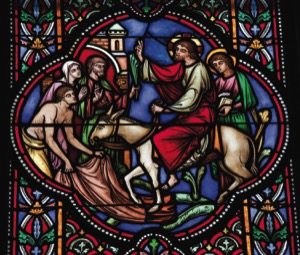
As a progressive Christian, I believe there are many names for God and many ways to a loving God; this article reflects one of those ways. Take from here what works for you. Celebrate life with joy and peace!
As we follow the stories of Jesus in the gospels, we see that he had somewhat of a flare for drama. I mean, feeding 5,000 people with three little loaves of bread and two fish? And turning water into wine; performing all sorts of miracles, and what about walking on the water!
As we look at the story of Jesus’ procession into Jerusalem, it had a bit of street theater in it. It was an event that took some planning – and it certainly made an impact – one that is celebrated to this day.
So, let’s take a closer look at this story. Jesus is traveling with his disciples, on his way toward Jerusalem, when he stops and gives very specific instructions to two of his disciples. They are to go into a village and get a donkey for Jesus.
Now, if we were there, we might have had a different response to this request. “A donkey? You want a little ‘ole donkey? You know, I think we can find something much better Jesus.” But we are told that the disciples did just as Jesus asked, went into the village, found a donkey, explained to the owners, who apparently were right there as the disciples were stealing their donkey, they explained to the owners why they needed it. And voila! Mission accomplished.
I’m sure there was some more dialogue that happened here, but things got worked out, and the disciples returned to Jesus with the donkey. Now, Jesus didn’t want there to be any confusion, whatsoever, about the message that he was going to be bringing when he arrived in Jerusalem. Riding on a donkey was a way of showing that he was not like a typical triumphant Roman king. This was a message of peace.
As Jesus approaches Jerusalem, people are waving palm branches and throwing their cloaks down and spreading them over the road. This is a common image we have in our minds when we think about Palm Sunday – the palm branches, the cloaks being thrown on the road, the cries of Hosanna, which literally translated from Hebrew means “I beg you to save.” Or, “please deliver us!”
I wonder, does it mean the same thing for us today that it did for the people there in the crowds on that day when Jesus entered?
Of course, we can never know what was going on in the hearts and minds of each person there in the crowds, but I can imagine that for many, when they cried out Hosanna, they were asking to be saved from the Roman Empire at the time. These were political cries, political hopes in a Messiah who would come and defeat the Romans who controlled Jerusalem.
The act of throwing one’s cloak down on the ground was a sign of homage and submission – of laying one’s self down in hopes that the coming King would be able to bring deliverance.
One theologian, Rev. A.W. Cleaveland says, “… that when we see Jesus entering in on the donkey, when we lay down our cloaks … I think what we’re really doing is laying down what we think about who Jesus is, and we’re laying down our ideas about Jesus.” Maybe that’s what some people in the crowd were doing that day.
Maybe it’s something we’re still called to do today. It’s no secret that people disagree. We all have different ideas of who this person Jesus was and is and what it is that he cares about, and what type of life he is calling us to. It’s so easy for us to become sidetracked by our own ideas of God, isn’t it?
And it’s scary how easy it is for us to let our vision of God become so narrow that we don’t allow ourselves to realize that God is so much bigger and grander than we could ever imagine.
And so, as we have heard this story again, some of us may find ourselves in the crowd yelling and cheering and waving our palm branches as Jesus enters into Jerusalem. We may be so excited that our moment of liberation has finally come!
We feel the excitement build, and we see Jesus and our hearts beat even faster, but when the donkey approaches, our grasp tightens around our cloaks, and we don’t want to let go. We don’t want to lay our cloaks down before Jesus. We don’t want to let go of what we think about Jesus, about what we hope to be true.
And as we look into his eyes, those piercing eyes full of love and understanding, we feel a sense of peace, even in the midst of the storm, we feel a wave of unconditional love wash over our wounded spirits bringing healing and hope and wholeness, and somehow we find ourselves loosening the grip, releasing our cloak, letting go.
And as is often the case with Jesus, when he enters Jerusalem that day, he came and turned everything upside down. “The first will be last. The last will be first. The meek will inherit the earth. You have to lose your life to find it …” Jesus didn’t claim special privileges. Instead, he lived a selfless, obedient life and then died a selfless, obedient death.
I am sure those who were welcoming Jesus into Jerusalem could never have guessed this was going to happen. And yet, we are told that they were laying their cloaks down; wouldn’t it be good if we were able to do the same and open ourselves to all that God wants to fulfill in our lives.











